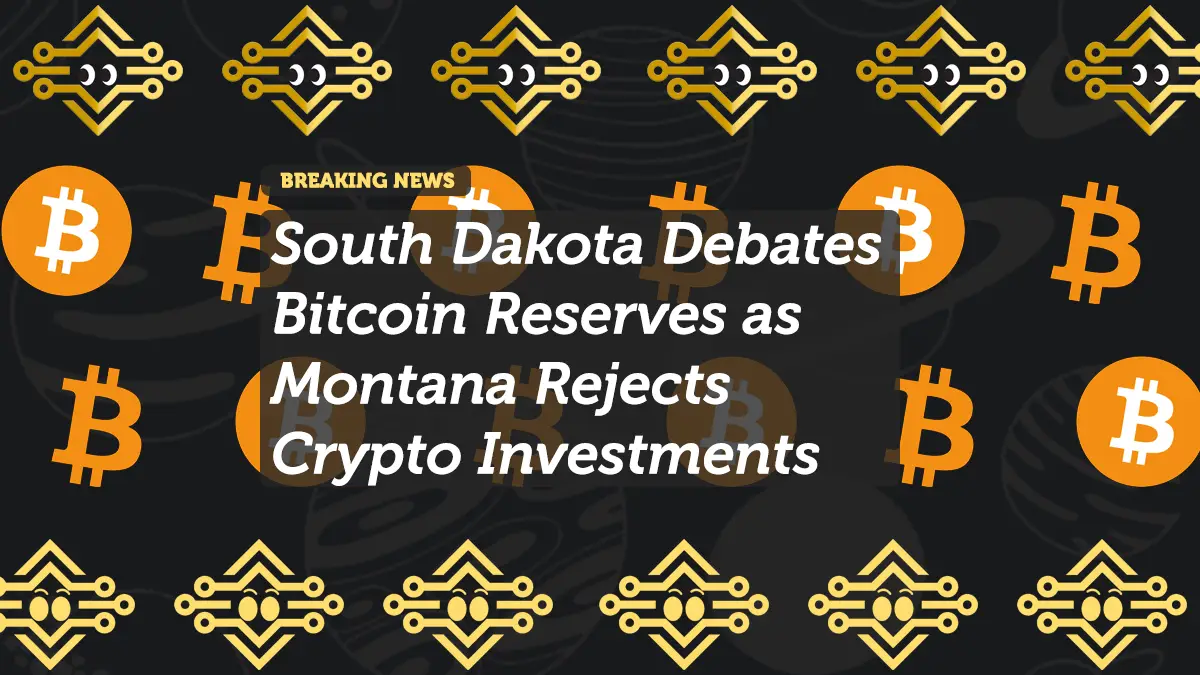
South Dakota Debates Bitcoin Reserves as Montana Rejects Crypto Investments
The state-level Bitcoin adoption debate is heating up.
South Dakota lawmakers are preparing for a hearing next week (early March 2025) to discuss whether the state should allocate up to 10% of its reserves to Bitcoin.
Montana just rejected a similar proposal, voting 41-59 against a $50M Bitcoin investment bill on February 22.
The Czech Republic is exploring Bitcoin as a reserve asset, potentially putting it ahead of most European nations.
With states and nations taking different approaches, the big question remains: Is Bitcoin a strategic reserve or a speculative gamble?
Let’s break down what’s happening in South Dakota, Montana, and beyond.
South Dakota’s Bitcoin Reserve Proposal: What’s at Stake?
What’s Being Proposed?
South Dakota Representative Logan Manhart introduced a bill to allocate up to 10% of the state’s reserves into Bitcoin as an inflation hedge and diversification tool.
Initial Investment Plan: Up to $370M in Bitcoin
Goal: Protect state reserves against USD inflation & economic instability
Challenge: Volatility concerns and political resistance
What Happened So Far?
February 24, 2025: The House Commerce and Energy Committee rejected the bill (9-3).
Next Step: Manhart isn’t giving up—a new hearing next week could keep the conversation alive.
“South Dakota could become the first U.S. state to officially hold Bitcoin. Will lawmakers embrace innovation or play it safe?”
This is a key moment. If passed, South Dakota could set a precedent for other states to follow.
Montana Rejects Bitcoin Investment Bill: A Step Back?
While South Dakota debates, Montana has already shut the door—for now.
What Happened in Montana?
February 22, 2025: The Montana House voted 41-59 against House Bill 429, which would have allowed the state to invest up to $50 million in Bitcoin and top altcoins.
Reason for Rejection: Concerns over taxpayer risk and Bitcoin’s volatility.
Key Opposition Argument: Representative Steven Kelly called BTC “way too risky” for public funds.
“Montana lawmakers: Crypto is too risky. Bitcoin maxis: Fiat is dying. Who’s right?”
Montana’s rejection shows that even in pro-crypto states, skepticism remains strong.
The Czech Republic’s Bitcoin Bet: A Global Perspective
While U.S. states debate, some nations are moving forward with Bitcoin reserves.
Czech National Bank’s BTC Plan
Governor Aleš Michl is leading discussions to allocate 5% of the Czech Republic’s $145B reserves to Bitcoin.
Rationale: BTC as a hedge against economic instability & a store of value like gold.
European Resistance: The ECB remains skeptical, warning against crypto reserve holdings.
“The Czech Republic might become Europe’s first nation to hold Bitcoin as a reserve asset. Will others follow?”
If this moves forward, it could influence other central banks—potentially even the U.S.
Why Are Some States/Nations Embracing Bitcoin While Others Are Hesitant?
Arguments for Bitcoin Reserves:
✔ Inflation Hedge: BTC’s fixed supply could protect against USD devaluation.
✔ Diversification: Holding BTC alongside traditional assets could reduce overall portfolio risk.
✔ Long-Term Growth Potential: Bitcoin’s historical returns outperform traditional assets.
Arguments Against Bitcoin Reserves:
❌ Volatility Concerns: BTC swings 10-20% in a day, posing risk for government funds.
❌ Regulatory Uncertainty: The SEC, Fed, and policymakers remain divided on BTC’s role.
❌ No Yield Generation: Unlike bonds, Bitcoin doesn’t generate income for government portfolios.
“Bitcoin in state reserves? It’s a test of long-term conviction vs. short-term fear.”
The debate isn’t just about Bitcoin—it’s about how governments manage financial uncertainty.
What Happens Next? Key Dates to Watch
March 3-4, 2025: South Dakota’s Bitcoin hearing—could determine whether the bill is reconsidered.
Ongoing 2025: Czech Republic’s central bank decision—could be a global game-changer.
Later in 2025: U.S. state-level Bitcoin reserve proposals—Arizona, Utah, and others watching closely.
“If South Dakota approves Bitcoin reserves, expect a domino effect across pro-crypto states.”
A single approval could set off a wave of Bitcoin adoption at the state level.
Final Thoughts: Is Bitcoin Going Mainstream in Government Reserves?
Bullish Case for Bitcoin Reserves:
✔ More U.S. states & nations are considering Bitcoin as a strategic asset.
✔ Inflation & economic uncertainty make BTC an attractive hedge.
✔ If early adopters succeed, others may follow—creating a global shift.
Bearish Case for Bitcoin Reserves:
❌ State-level rejection (like Montana) shows lingering skepticism.
❌ Governments prefer low-risk, income-generating assets over BTC.
❌ Regulatory uncertainty could delay large-scale adoption.
What’s Your Take?
Should governments hold Bitcoin in their reserves—or is it too volatile for public funds? Drop your thoughts below!














